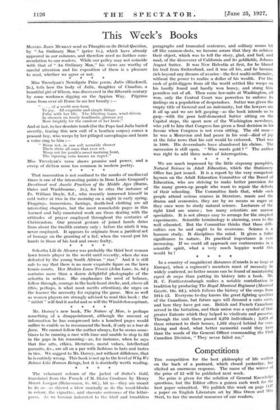The vehement colours of the jacket of Sutter's Gold, translated
from the French of M. Blaise Cendrars by Henry Stuart Longan (Heinemann, Ss. 6d.), hit us—they are meant to do so- –as shrewd a blow mentally as do the wood-blocks in colour, the vignettes, and staccato sentences of the -letter- press. As we become indurated to the bluff and breathless
paragraphs and truncated sentences, and solitary nouns let off like cannon-shots, we become aware that they do achieve their object, which was to tell the story, glad, and bad, and mad, of the discoverer of California and its goldfields, Johann August Sutter. It was New Helvetia at first, for he blazed his trail from Switzerland, and it was all his, and he became rich beyond any dreams of avarice—the first multi-millionaire, without the power to realize a dollar of his wealth. For the rush of gold-diggers from all the world settled like wasps on his hardly found and hardly won honey, and stung him penniless out of all. Then came law-suits at Washington, all won, only the Central Court was powerless to enforce its findings on a population of desperadoes. Sutter was given the empty title of General and an indemnity, but the lawyers ate it all up and we are left gasping—as the book intends us to gasp—with the poor half-demented Sutter sitting on the Capitol steps, the sport now of the Washington newsboys, who yell to him that Congress has given a final decision in his favour when Congress is not even sitting. The old man— he was a Moravian and had peace in his soul—died of joy at the false news that his suit would be enforced. That was in 1880. His descendants have abandoned his claims. The succession is still open. " Who wants gold ? " The author was right to add three notes of interrogation.














































 Previous page
Previous page